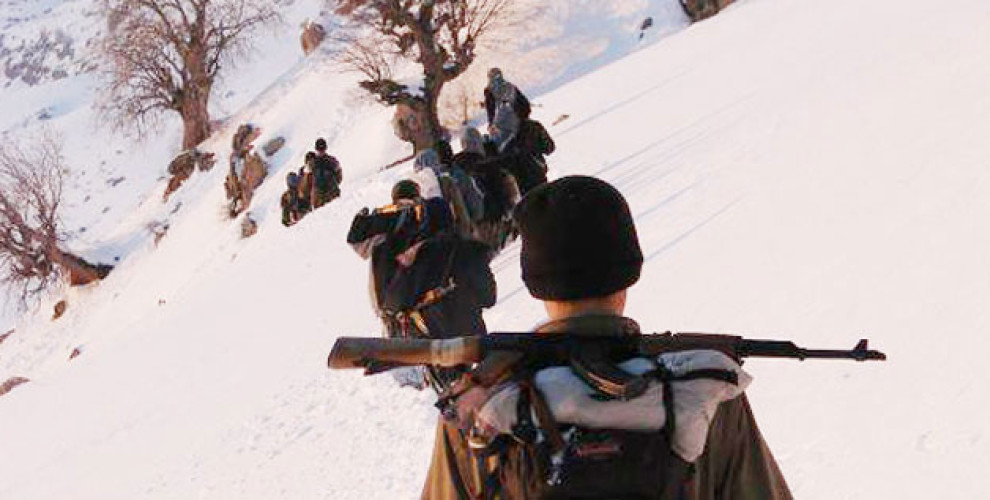PKK's Kalkan tells how 15 August 1984 actions were planned
‘What we did in 34 years is the same as what we will do in the 35th year’, said Duran Kalkan.
‘What we did in 34 years is the same as what we will do in the 35th year’, said Duran Kalkan.

This year marks the 34th anniversary of the 15 August actions by the PKK against the Turkish army. The fight has gone on for 34 years and that date has changed the fate of Kurdistan and the Middle East.
Kurdistan Workers' Party (PKK) Executive Committee member Duran Kalkan said: "If the PKK and therefore the 15 August attack did not exist, Kurds and Kurdishness would not even exist, and there would not even be a word spoken on Kurds and Kurdistan”.
Kalkan spoke to Yeni Özgur Politika about how this war came about, how it was prepared, who took part in the actions, why Eruh and Semdinli were chosen…
It’s 15 August again. What kind of war has been carried out in the last 34 years? How did this war come about?
First of all, I would like to commend my people, all comrades, in particular Leader Apo, our heroic martyrs beginning with Comrade Agit, immortal commander of the 15 August actions.
Leader Apo said on the 10th anniversary of 15 August that ‘what we did in the last 10 years is the same as what we will do in the next 10 years’. So now, what we did in 34 years is the same as what we will do in the 35th year.
The last 34 years have been the most important heroic period for Kurdistan and Kurdish people. Full of heroism. We fought for freedom, we won honor and introduced ourselves to free humanity. The price was high, with over 40,000 martyrs. This is one of the most unequal, toughest wars of history. Again, against the most cruel and unjust enemies of history.
Nevertheless, the Kurdish people created a spirit of freedom, consciousness, willpower, organization with a struggle that was one hundred percent right. National renaissance has come with a war based on freedom.
The war against DAESH is a war to protect the peoples of the region and the humanity against fascism.
Despite the hardships and difficulties much is what we have won.
If there had been no PKK and therefore no 15 August, what would have been of Kurdishness and Kurdistan?
We would even hear the words Kurdistan and Kurds. This is definitely like this.
On 15 August 1984 the KDP and Barzani were not even in the process. They were scattered all over the world. They took refuge in Iran. They were too exhaused to to take a step, they were in the position of refugees.
Kurdishness, the name Kurdistan, the spirit of freedom, consciousness, will, organization and current political gains have all been achieved thanks to the guerrilla resistance initiated on the basis of the 15 August actions.
We gave 40,00 martyrs' lives as PKK. This day they live in the Democratic Nation. They live as guerrillas. They live in women and youth movements.
These are indisputable facts. Which is why we are so proud and honoured to have achieved so much.
So, to go back to the question, how did this war come around? It was actually the result of a process.
It was the result of a struggle we started in 1973. Then came the party, on 27 November 1978, then the Hilvan-Siverek resistance, then in 1982 the great prison resistance in Amed.
So, 15 August 1984 is the sum of all these.
Why the 15 of August then?
This also was a decision taken as a result of a process. Of course, concrete actions had been taken, steps had been taken, but not everything depended on those decisions, it is important to know where they are coming from.
The first PKK Conference, held in July 1981, took the decision to return to the country and start a guerrilla war in North Kurdistan.
Then the PKK made its second Congress in 1982, and established that the decision should be implemented immediately.
The actions in Eruh and Semdinli were chosen as the first actions and they had to be carried out on 15 August.
We wanted the actions to be seen by the society. If at least three actions were carried out in an area that would include such three provinces (Hakkari, Van and Sirnak, represented by Eruh, Çatak and Şemdinli), then the actions would be meaningful and information would be disseminated and spread. Indeed it did.
Indeed the success rate was two-thirds, as Çatak did not succeed. But it was important, because it actually started a new process in terms of creating a guerrilla initiative.
What if Çatak had succeeded?
Undoubtedly, had we realised the Çatak action as well, the effect would have been even stronger.
However, military actions are not always easy, not always achievable. It is difficult to achieve a 100 percent success.